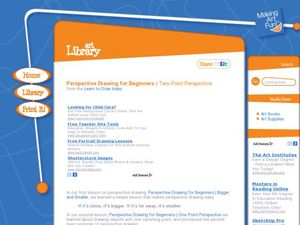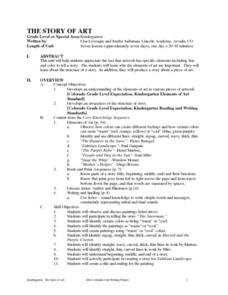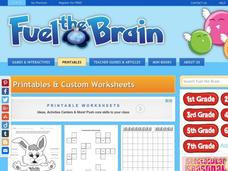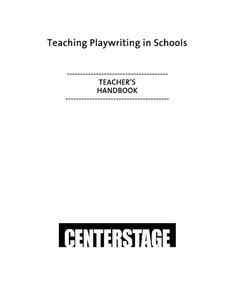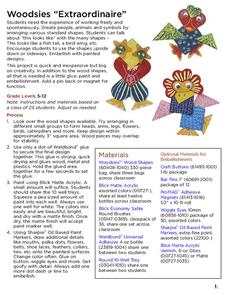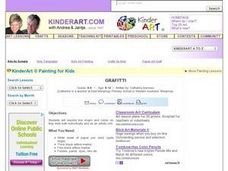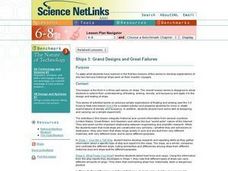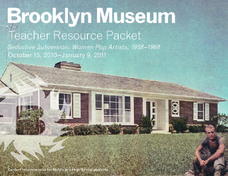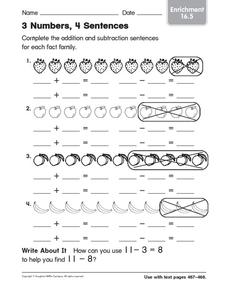Curated OER
Perspective Drawing for Beginners-Two Point Perspective
Students inspect two point perspective. In this perspective lesson plan, students explore drawing with two vanishing points. Students create an original piece of art using two point perspective.
Curated OER
Repeated addition, Multiplication and Division
Not only will your class practice solving addition, multiplication, and division word problems, but they also have the opportunity to try to put the mathematical expression into words. These skills will help your students with future...
Curated OER
Addition
In this addition worksheet, students count the dots on each domino and fill in the missing numbers to complete the addition facts for the 13 problems.
Curated OER
The Story of Art
Students canvass the important elements of art in the seven lessons of this unit. Story structure and in particular, color is perceived as essential to the development of the idea of a picture.
Curated OER
Expression And Joy With Line, Shape And Color
Students create positive and negative art shapes and compose a piece of Expressionistic art using those shapes and the ideas of color, line, and shape in this 5th through 8th grade Art lesson plan. Options are available for individual...
Curated OER
Name For Numbers
In this same number facts worksheet, 2nd graders use either addition or subtraction to solve 8 math problems and then place the two math problems that match the numbers at the bottom of 4 trees on the lines provided.
Fuel the Brain
Addition
Addition is much more fun when you are finding the sum of different types of food! Your class will get hungry while solving these addition problems about hamburgers, hot dogs, and their condiments.
Curated OER
Addition Start Unknown
Young learners will test their understanding of the operations and the strategy of addition in this worksheet. For the visual learners, there is space underneath each word problem for them to make illustrations to help them with solving...
Curated OER
Mix-Up
In this number sentence worksheet, 3rd graders look at 2 game boards and find as many number sentences as they can that are hidden in each one. Students put their answers on the lines provided.
Curated OER
Telling Time Worksheet: Drawing Hands on a Clock
Can your learners tell time? Give them practice with this resource. For each of nine clocks, youngsters must use the numerical time to draw the hands on the clock.
Curated OER
Addition up to 5
In these addition worksheets, students complete several addition problems using the blocks in the first 8 problems. Students then complete 8 more sets of addition problems that use visual aids and tables for help.
Fuel the Brain
Addition Change Unknown
Anna and Ryan don't have enough materials for their personal collection or to give away equally! Your pupil will read about their dilemma in their respective word problems and determine how many more of their item they need using...
Learning to Give
Teaching Playwriting in Schools
The world is a stage, and so is your classroom! Hone the skills of the next generation of Tony® award winners with a set of exercises, reference pages, writing prompts, and excerpts from famous plays.
Curated OER
Woodsies "Extraordinaire"
Allow your class to use their imaginations and create fun creatures with various wooden shapes and other embellishments. What a great way to encourage your young artists to stretch their minds!
Curated OER
Notating a Rainy Day
Young singers learn how to notate the rhythms and melodies of a familiar song using Kodaly hand signals and manipulatives. Individuals then create their own compositions and sing them using Kodaly notation.
National Endowment for the Humanities
Lesson 1: In Depth with the Full Spectrum
High schoolers study the ways in which an artist can use color. They view various images of artwork and discuss the effect of color on spacial dimensions, focal points, tone, and mood.
Hawaiʻi State Department of Education
Rhythm Patterns
Fractions can be tricky. Why not have kids think of fractions like they think of eighth, quarter, and half notes? In teams, the class creates four-measure patterns with their percussion instruments. They need to explain their rhythm...
Curated OER
Graffitti
Here is a fun way to encourage a cooperative classroom, drawing skills, and creative expression. Each child draws a design or shape on his paper, then he rotates to the next child's paper where he adds to the previous design. When the...
Curated OER
Save the Lofty Trees
Save the Lofty Trees, by Leslie Mills, provides the text for a study of the roles of animals and humans in the forest. Richly detailed, the plan offers two approaches to the play: as a scenario for children to imagine what actions would...
Curated OER
All About Me
Using technology, learners create and deliver a multimedia autobiographical presentation to present to the class. This ambitious lesson has learners use a variety of sources both old and new; magazines, poster board, the Internet, and...
Curated OER
Ships 3: Grand Designs And Great Failures
Students engage in this, the third in a three-part series on ships. The overall lesson series is designed to allow students to extend their understanding of floating, sinking, density, and buoyancy and apply it to the design and testing...
Brooklyn Museum
Seductive Subversion: Women Pop Artists, 1958–1968
What role did women play in pop art during the 1950s and 1960s? The class researches the role of women in mid-century America and how those roles were portrayed through the pop art of the time. They use an excellent set of...
Curated OER
3 Numbers, 4 Sentences
In this addition and subtraction worksheet, students complete the addition and subtraction sentences for each fact family. Students write their answers on the lines.
Curated OER
TWO-FOR ONE FOUNDATION PIECING
Students sew on a line, you can make reversible quilts, clothing, and more using the principles of foundation piecing. With my method, fabrics are placed on both sides of a permanent foundation, a template is used to mark the sewing line.
